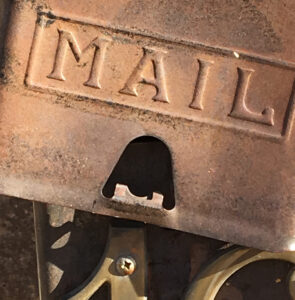 Every Monday through Saturday, when I hear the clink of the mailbox lid, I remember a time in my early twenties when, dazed by all the career choices for which I didn’t qualify, I decided to give my life to the United States Postal Service. I didn’t have any idea how to make this happen, but I knew why I wanted it to happen, starting with my affection for our local New York City post office where, even before my head reached an inch above the counter, I was fascinated by the little cubicle in which sat a postal employee named Barnes, an older man with an afro. The cubicle reminded me of a tiny jail, though had I been Catholic it might have brought to mind the confessional. Barnes sorted my mother’s bills and change and slid a roll of stamps in her direction, for which she thanked him and turned to go. It was at this precise moment that Barnes winked at me. Every time. I loved that wink and carried it home with me and into the future.
Every Monday through Saturday, when I hear the clink of the mailbox lid, I remember a time in my early twenties when, dazed by all the career choices for which I didn’t qualify, I decided to give my life to the United States Postal Service. I didn’t have any idea how to make this happen, but I knew why I wanted it to happen, starting with my affection for our local New York City post office where, even before my head reached an inch above the counter, I was fascinated by the little cubicle in which sat a postal employee named Barnes, an older man with an afro. The cubicle reminded me of a tiny jail, though had I been Catholic it might have brought to mind the confessional. Barnes sorted my mother’s bills and change and slid a roll of stamps in her direction, for which she thanked him and turned to go. It was at this precise moment that Barnes winked at me. Every time. I loved that wink and carried it home with me and into the future.
I assumed I’d be a letter carrier and spend all my time outside. This suited me. Outdoor jobs were hard to come by in New York. Anyone who braved the winter weather was either a letter carrier, a stevedore, a construction worker, or a little off the beaten track—like the lady who fed the pigeons in Central Park, or the man outside the Guggenheim, dressed in black and thin as a whisp of smoke, who walked like a dancer and seemed to live in a silent world. My mother called him a mime. But if it were true that neither snow nor rain nor heat nor gloom of night could stay us couriers from the swift completion of our appointed rounds—well, I thought that would be a noble profession to pursue. Just how to pursue it?
I was told I had to take a test, and on testing day I sat in a room with a dozen others applying for civil service jobs. We sat at school desks, four feet apart, facing an enormous blackboard. The test was long and unremarkable, and I employed the magical thinking I relied on for every test I’d ever taken, deciding I’d done well even though I finished only half of it. A rotten tester, slow and meticulous, that was me. Needless to say, I never heard from the postal service, not even to thank me for my misplaced and naïve enthusiasm.
These days, I greet my letter carrier when I see him, though he works hard and doesn’t have time for small talk. Or big talk. Or talk of any size. He moves balletically and the sound of the mail truck is the orchestra that accompanies this ancient ritual of moving language across distance in a tactile and most old-fashioned way. I am happy his hands have caressed my mail—his and the hands of how many others? I greet him as a way of thanking him for his service to that cultural relic called the U.S. Mail.
My friend Laura Kelly and I were recently talking about the fright we still get, years and years into this writing business, when we feel our creativity has left us. We never trust it will return. I want to tell her this: centuries have passed and the old ritual of handwritten and delivered creations continues, unapologetic in the face of doubt and the lusty promises of the virtual world. There is something in us and around us that will not give up, that calls into being our imaginations, that requests the pleasure of their company at our next waking moment. If neither snow, rain, heat, nor gloom of night can stay these couriers from the swift completion of their appointed rounds, occasional lulls in the rush of creative juices cannot stop the artistic machine. Sometimes there’s a delay while the blizzard rages and the plows scrape the road. Sometimes there’s the necessary struggle when the internal forces of creativity do battle with our personal insistence upon productivity. Sometimes the mail planes have to sit on the runway and wait while the de-icing machines make their engines worthy of flight. Sometimes we must get quiet and still in order to fly.
Take my word. Just as your mailbox will always fill up with letters, even if they are letters you write to yourself, creating is the deepest part of an artist’s nature and even if it feels thin and weak sometimes, it doesn’t stop. Not for snow, not for rain or heat; not for broken bones or flattened hearts; not for lack of recognition; not for an empty theater; not for fever, illness, or present dismay. As for gloom of night, many consider that the muse.

